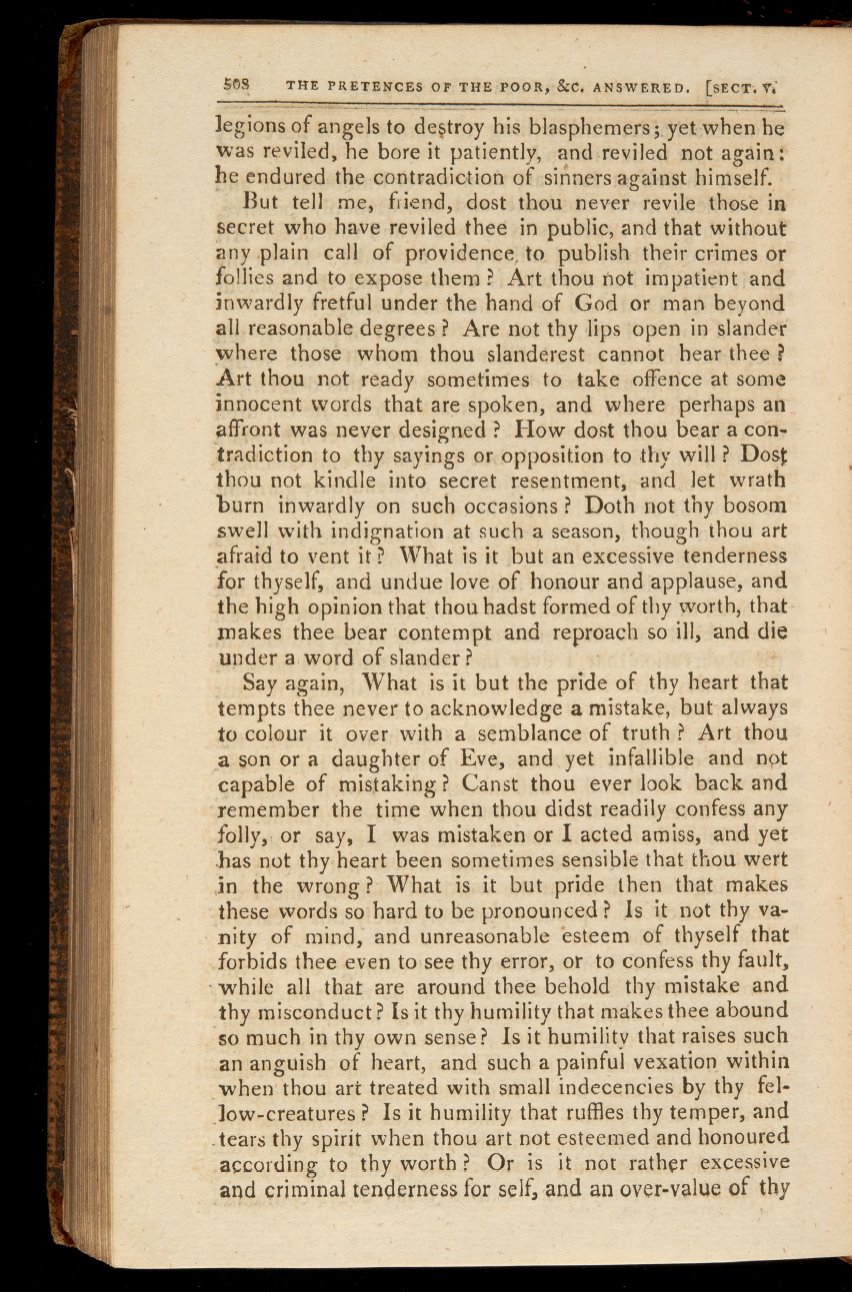

503
THE
PRETENCES
OF
THE
POOR,
&C.
ANSWERED.
[SECT
V;
-._.__._-._,_...__
--
legions
of
angels
to
destroy
his
blasphemers;
yet
when
he
was reviled,
he bore
it
patiently, and
reviled
not
again:
he endured
the
contradiction of
sinners
against
himself.
But
tell
me, friend, dost
thou never
revile
those
in
secret who have
reviled
thee
in
public, and that
without
any plain
call
of
providence,
to
publish their
crimes or
follies and
to
expose them
?
Art
thou
not
impatient
and
inwardly
fretful
under the
hand
of
God or man beyond
all
reasonable degrees
?
Are
not thy
lips
open
in
slander
where
those whom
thou slanderest cannot hear
thee
?
Art
thou not ready sometimes
to
take
offence
at
some
innocent
words
that
are
spoken, and where
perhaps
an
affront was never
designed
?
How
dost
thou bear
a
con
-
tradiction
to
thy sayings
or
opposition
to thy will
?
Dost
thou
not kindle into secret
resentment,
and let
wrath
burn
inwardly
on
such
occasions
?
Doth
not thy bosom
swell
with indignation
at such
a
season,
though thou art
afraid
to
vent
it
?
WThat
is
it
but
an
excessive
tenderness
for thyself, and
undue
love
of
honour and applause,
and
the
high opinion that thou
hadst
formed
of
thy
worth,
that
makes
thee bear contempt
and reproach
so
ill,
and
die
under
a
word
of
slander
?
Say
again,
What
is
it
but
the pride
of
thy
heart that
tempts
thee never
to
acknowledge
a
mistake,
but
always
to colour
it
over with
a
semblance of truth
?
Art
thou
a
son
or
a
daughter of
Eve, and yet
infallible and
not
capable of mistaking
?
Canst thou
ever look
back
and
remember the
time when thou didst
readily confess any
folly,-
or
say,
I
was
mistaken
or
I
acted
amiss,
and yet
has not
thy
heart been
sometimes sensible
that
thou wert
in the
wrong? What
is
it
but
pride
then that
makes
these words
so
hard
to
be
pronounced
?
Is it
not
thy va-
nity of mind,
and unreasonable esteem of thyself that
forbids thee
even to
see
thy
error,
or to confess thy
fault,
while
all
that
are
around thee
behold thy mistake
and
thy misconduct?
Is it thy
humility that makes thee
abound
so
much
in
thy
own sense?
Is
it humility
that
raises
such
an anguish
of
heart,
and
such
a
painful vexation
within
when
thou art
treated
with small
indecencies
by thy fel-
low-creatures
?
Is
it
humility
that
ruffles
thy
temper, and
tears
thy
spirit when thou
art
not
esteemed
and honoured
according
to
thy worth
?
Or
is it
not
rather
excessive
arad
criminal tenderness
for
self,
and
an
over -value
of
thy

















